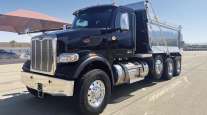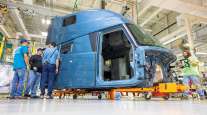Staff Reporter
ACT Virtual Series Highlights Environmental Sustainability Challenges

[Stay on top of transportation news: Get TTNews in your inbox.]
Advanced Clean Transportation on Aug. 18 kicked off a four-month series to discuss environmental sustainability in trucking and the challenges those efforts still face.
“Whether we’re going to end up with fuel cells or whether we’re going to end with hybrid technology or pure battery electric vehicles, we’re investing in companies and technology that can be supported within that,” said Ryan Laskey, senior vice president of the commercial vehicle group at Dana Inc. “We definitely have to have a balance, and we work to do that.”
Laskey added that the market is not going to transition overnight. Companies are going to have to show the technologies have value and are reliable, which involves having industry partners that companies can trust to stick with them through the years, he said.

Schaefer
Added Kary Schaefer, general manager of marketing and strategy at Daimler Trucks North America: “Economic sustainability and environmental sustainability really need to go hand in hand. Many companies, the most successful companies, have demanded that on an ongoing basis.”
Schaefer said it’s an ongoing challenge to balance traditional products with investments in new technologies. She also said the industry has already seen improvements such as reductions of greenhouse gases.
As with most industries, the coronavirus pandemic quickly became an unexpected hurdle for trucking, including fleets working to become more sustainable. They had to focus on employee safety and a rapidly changing market.
“We were really focused on keeping our dealers and customers running while supporting our drivers, who were essential to delivering freight during this time. I would say we doubled down on our commitment and investments in product development and sustainable technologies,” Schaefer said.
Daimler finished delivering a round of electric trucks to customers right before the coronavirus pandemic hit.
The panel also discussed how infrastructure challenges make the transition to electric alternatives harder because carriers that go electric need charging stations.

Harper
Craig Harper, chief operations officer at J.B. Hunt, recalled the infrastructure was slow to adapt when natural gas was on the rise.
“We learned through that. We got to have a better infrastructure setup,” Harper said. “It’s very expensive. So we have to rely on incentives early on to get our feet wet and prove out the technology. Now don’t get me wrong, we can’t make a long-term business plan based off incentives. Incentives will help us get a jump-start, but then we have to see that it is a viable piece of equipment in the long run.”
J.B. Hunt announced that it completed its first delivery using the Freightliner eCascadia on Aug. 11. Daimler produces the completely electric Class 8 vehicle. It’s expected to have a driving range of up to 250 miles on a full charge.

Transport Topics introduces its newest digital interview series, Newsmakers, aimed at helping leaders in trucking and freight transportation navigate turbulent times. Audience members will gain access to the industry's leading expert in their particular field and the thoughtful moderation of a Transport Topics journalist. Our second episode — "The Evolution of Electric Trucks" — featured Nikola founder and executive chairman Trevor Milton. To view the replay, complete this form.
J.B. Hunt ranks No. 4 on the Transport Topics Top 100 list of the largest for-hire carriers in North America and No. 4 on the Transport Topics Top 50 list of the largest logistics companies.
RELATED: J.B. Hunt Progresses Toward Sustainability Goals
“This technology needs to come to market with the whole ecosystem involved,” Laskey said. “We’re bringing the technology, but that quickly moves into how am I going to service it, how am I going to maintain it?”
Laskey added he has been focusing on training and making sure companies are prepared to handle maintenance and trucks that are down. Dana has also opened a training center.
Want more news? Listen to today's daily briefing:
Subscribe: Apple Podcasts | Spotify | Amazon Alexa | Google Assistant | More




